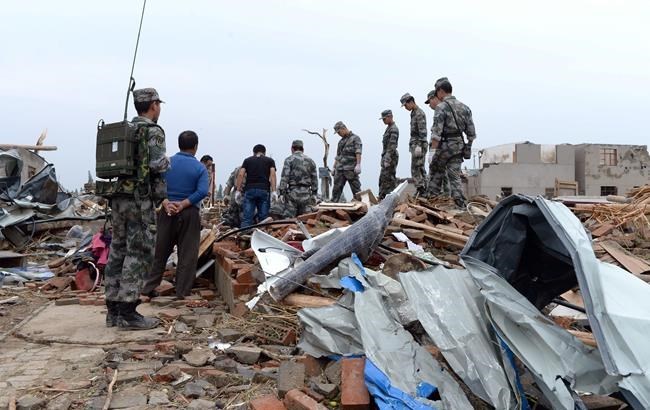
Chinese paramilitary policemen search for survivors on the rubble of a destroyed building in Funing county in Yancheng city in eastern China's Jiangsu Province Friday, June 24, 2016. One day after the storm, rescuers on Friday continued searching for survivors in this densely populated area of farms and factories on the outskirts of the major city of Yancheng in Jiangsu province. The twister was one of the most extreme weather events witnessed by China in recent years, leaving a swath of destruction with destroyed buildings, smashed trees and flipped vehicles on their roofs. (Chinatopix via AP) CHINA OUT
Republished June 24, 2016 - 5:28 AM
Original Publication Date June 23, 2016 - 6:00 AM
YANCHENG, China - Teacher Guo Haimei said the ferocious wind, blacked with dust and debris, seemed to descend out of nowhere onto her kindergarten and its 120 pupils.
Within minutes, the powerful tornado and its accompanying rain and hailstorm had scythed through the area of eastern China with merciless force, leaving almost 100 people dead and another 800 injured.
"I was very scared. I had no idea what was happening," said Guo. "When I tried to close the door, my hand was injured by the wind pushing it back."
Guo and her mostly 6-year-old pupils were among the lucky ones. Although the school was heavily damaged, just seven students were injured, two of them seriously.
One day after the storm, rescuers on Friday continued searching for survivors in this densely populated area of farms and factories on the outskirts of the major city of Yancheng in Jiangsu province.
The twister was one of the most extreme weather events witnessed by China in recent years, leaving a swath of destruction with destroyed buildings, smashed trees and flipped vehicles on their roofs. A sprawling solar panel factory was shredded, forcing fire crews to secure toxic materials before they leaked into neighbouring waterways.
As the death toll climbed to 98 on Friday, doctors said most of the 800 injured had broken bones and deep lacerations, especially on the head. Medical crews dad been rushed to the area, about 800 kilometres (500 miles) south of Beijing.
Rescuers carried hurt villagers into ambulances and delivered food and water, while army units worked to clear roads blocked by trees, downed power lines and other debris. While the weather cleared Friday, forecasters were warning of the possibility of more heavy rain, hailstorms and even additional twisters.
"The people inside tried to run outside, but the wind was too strong so they couldn't," Xintu villager Wang Shuqing told an Associated Press reporter. "My family members were all inside, they all died. The police then came and took the bodies out. I can't bear it."
The disaster was declared a national-level emergency, and on a trip to Uzbekistan on Thursday, Chinese President Xi Jinping ordered the central government to provide all necessary assistance.
Tents and other emergency supplies were being sent from Beijing, while schools and other facilities were used to shelter survivors, state broadcaster CCTV said.
Cellphone and security camera footage showed the tornado's debris-blackened funnel touching down and golf-ball size hailstones falling thick as rain. Terrified residents who sought to hold back doors that were subsequently blown in spoke of a "black wind" that tore the glass from all windows.
Reports said the tornado struck at about 2:30 p.m. and hit Funing and Sheyang counties on the city's outskirts the hardest, with winds of up to 125 kilometres (78 miles) per hour. Twisters of that magnitude are considered capable of inflicting moderate damage, but the accompanying hailstorm appeared to have also contributed significantly to the destruction that reduced farm buildings to mere piles of bricks and tiles.
Cars and trucks lay upside down, street light poles snapped in half, and steel electricity pylons lay crumpled on their side. Power and telephone communications were knocked out over a broad area.
Tornados occasionally strike southern China during the summer, but rarely with the scale of death and damage caused by the one on Thursday. Last year, a freak wind described as a tornado was blamed partly for causing a cruise ship to capsize in the mighty Yangtze River on June 1, killing 442 people.
Volatile atmospheric conditions over the Yangtze River delta are common in June when warm and cool air currents meet, but further studies are needed to determine why Thursday's tornado was so fierce, said Ding Yihui, a researcher at the National Climate Center of China's Metrological Administration.
Global climate change is also seen as a factor in increasing the frequency and severity of extreme weather events, Ding said.
"In the U.S., there could be as many as a dozen or more tornadoes in a single day, but in China there are more rare and isolated," Ding said. "We are able to forecast a severe convective weather, but we aren't able to forecast the time of the occurrence of a tornado, let alone the severity of a tornado."
___
Bodeen reported from Beijing. Associated Press researcher Yu Bing in Beijing contributed to this report.
News from © The Associated Press, 2016